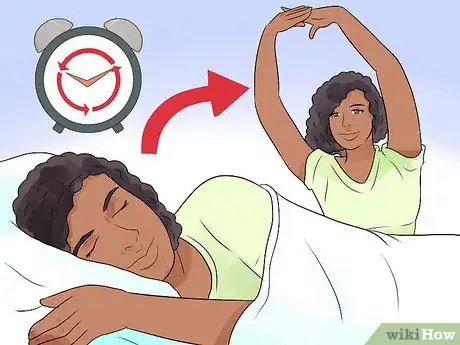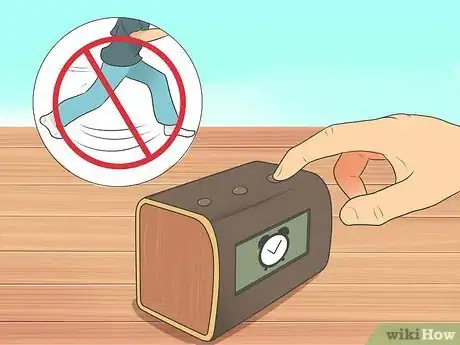This article was co-authored by Jennifer Butler, MSW. Jennifer Butler is a Love & Transformation Coach and the Owner of JennJoyCoaching, a life coaching business based in Miami, Florida, although Jennifer works with clients all over the world. Jennifer’s work centers around empowering women who are navigating any stage of the divorce or breakup process. She has over four years of life coaching experience. She is also the co-host of the Deep Chats Podcast along with Leah Morris and the host of season 2 “Divorce and Other Things You Can Handle” by Worthy. Her work has been featured in ESME, DivorceForce, and Divorced Girl Smiling. She received her Masters of Social Work (MSW) from New York University. She is also a Certified Health Coach, a Communications & Life Mastery Specialist, and a Certified Conscious Uncoupling and Calling in “the One” coach.
There are 16 references cited in this article, which can be found at the bottom of the page.
wikiHow marks an article as reader-approved once it receives enough positive feedback. In this case, 86% of readers who voted found the article helpful, earning it our reader-approved status.
This article has been viewed 151,525 times.
Mornings can be very busy and sometimes it’s hard to remember to be healthy. If you feel like your morning routine has become unhealthy and you’d like to make some changes, there are simple things you can do to improve it. Taking time to eat breakfast, write about a happy memory, or give someone a hug may be all that you need to have a healthy start to your day. Keep reading to learn more about how to start a day in a healthy way.
Steps
Creating Healthy Morning Habits
-
1Develop a morning routine.[1] If you don’t have much structure to your mornings, make a plan to change that. Having a good morning routine can help you to wake up feeling like you have a direction and purpose. If your morning routine has not been working out for you, make a plan to change the way you wake up and start your day.
-
2Get a good night’s sleep. Sleep deprivation can cause a wide range of health problems, so it’s important to make sure that you are getting enough sleep every night. Your sleep needs are based on your age as well as other factors. For example, adults need between 7-8 hours of sleep per night, but if you have been sleep deprived for a while, you may require more until your body recovers.[2]Advertisement
-
3Stretch as soon as you wake up. You might instinctively stretch in the morning, but if not it’s a good habit to incorporate. You don’t have to spend much time stretching to reap the energizing benefits. Even 30 seconds of stretching can help get your day off to a healthy start.[3]
- If you have more time in the morning, try doing some morning yoga. Yoga will stretch your body, increase blood flow, and help you build strength.
-
4Exercise in the morning. Morning exercise is a great way to get your day off to a healthy start. You should aim for 30 minutes of exercise every day, but even 15 minutes of exercise in the morning can help you to feel more energized and healthy all day. Some research has even found that morning exercise helps improve sleep and getting enough sleep is essential to having a healthy start to your morning.[4]
- Get a workout DVD that you can do right in your living room first thing in the morning or look up workout videos on the internet.
- Try walking or biking to work to add a little more movement to your morning. If you take the bus or subway to work, try getting off a stop or two before your usual stop and walk the rest of the way. If you drive, try parking your car in a spot that far away from the entrance.[5]
- If you have time, you can even take your dog for a quick walk around your block.
-
5Take a morning shower. Getting up and hopping in the shower first thing in the morning can help you to feel more alert, but it can also help start your day on a more relaxing and pleasant note. Use body wash and other products that smell nice and allow yourself plenty of time for a luxurious shower.
- Make your morning shower even more enjoyable by listening to your favorite music and singing along. Research has shown that our brains release dopamine when we listen to music and oxytocin when we sing. These chemicals reduce stress, increase feelings of happiness, and help keep us mentally and physically healthy. Combining music and singing while you shower will provide some great benefits for your brain and body at the beginning of your day.[6] <
- Try adding a cold blast of water at the end of your shower to increase your circulation and feel more awake. [7]
-
6Eat a good breakfast. To have a healthy start to your day, breakfast is a must. Eating a healthy breakfast every day has been shown to help people maintain a healthy weight, have more strength and endurance, and concentrate better on difficult tasks.[8] Make sure that you are eating a breakfast that includes complex carbohydrates, fruit, and some lean protein.
- Avoid high calorie breakfast options like eggs, bacon, and pancakes. You should also try to limit juice and processed foods in the morning to get your day off to a healthy start. Some fruit such as apples and bananas is a good option.
- Try making yourself a smoothie if you usually eat breakfast on the go. Blend some frozen fruit with other ingredients like yogurt, tofu, or low-fat milk to create a nutritious breakfast that you can take with you.
-
7Drink water. Proper hydration is important for your body to function well. Drinking water helps with digestion, metabolism, skin and muscle health, and kidney function. After a night of sleeping and perspiring, your body needs to be rehydrated. Drink a glass of water as part of your morning routine and fill a water bottle to bring with you when you head to work or school.[9]
- Choose water instead of juice, soda, or other sugary beverages.
Preparing to Have a Healthy Day
-
1Improve your bedtime habits. Getting a good’s night sleep is not always easy, but you can make it better by working to improve your bedtime habits. Consider your usual evening routine and think about what might be preventing you from getting a good night’s sleep. Do you drink caffeinated beverages late in the day? Do you have a hard time relaxing at night? Use the following suggestions to help you improve your bedtime habits.[10]
- Make your bedroom a pleasing, relaxing space. If your bedroom is messy or cluttered, you might have a hard time relaxing at night. Make sure that it is clean and attractive so that you don’t have anything distracting you from getting a good night’s sleep.
- Don’t have any alcohol, caffeine, or nicotine at least three hours before bed. Alcohol, caffeine, and nicotine can disrupt your sleep cycle, so it’s best to avoid these substances in the hours leading up to your bedtime.
- Do something to relax before bed. Reading in bed for 10-15 minutes, meditating, or talking to your partner are good ways to calm down and get ready to sleep. Avoid watching television or playing video games right before bed because they may cause you to become more alert.
-
2Go to bed and wake up at the same time every day. Having a consistent sleeping and waking times are essential to starting your day in a healthy way. If your bedtimes and wake up times are erratic, try to correct the problem by setting a regular bedtime and wake-up time that you can stick to. Also, make sure that you will give yourself enough time to get your recommended amount of sleep every night. For example, if you need to be at work by 8 am every morning, you may need to wake up by 6:30 to have enough time to get ready and get to work on time. Therefore, you should go to bed no later than 10:30 pm every night to get the right amount of sleep.[11]
- Try a sleep monitor or tracker to make sure you are getting enough sleep every night.
-
3Wake up gently. A jarring alarm clock may be getting your day off to a stressful start. If your alarm clock stresses you out, try using an alarm clock that wakes you up with a progressive sound or that uses light instead of sound to wake you up. There are even some apps for smartphones that can help you to wake up gently rather than with a loud, jarring alarm sound.[12]
- Don't hit the snooze button. Hitting the snooze button has been shown to be more harmful than helpful because the extra few minutes you get when you hit snooze do not actually provide you with quality rest.[13]
-
4Set a positive tone for your day. Sometimes getting up early is enough to put someone in a bad mood and set a negative tone for the entire day. Setting aside a few minutes every morning to focus on positive things can help get your day off to a better start. Avoid watching the news or reading about things that will upset you first thing in the morning.[14]
- Try journaling about a happy memory or reading a positive quote or story. If you are religious, you could take a few minutes to read from a spiritual text and consider the verses you read.
Reducing Stress the Morning
-
1Give yourself plenty of time. Having to rush around to get ready in the morning does not start your day on a good note. In fact, you may end up having extra stress first thing in the morning because you have to rush. If you often find yourself rushing or running late, you may need to start waking up a bit earlier to give yourself more time to get ready. Try setting your alarm for 15 minutes before your normal wake-up time to see how it changes your morning routine.
-
2Connect with family or friends. Even if you are in a hurry in the morning, taking a few moments to connect with your family or friends can help get your day off to a great start. Simply taking a second to give your family members a hug and say “I love you,” or tell your roommate to have a good day can be beneficial. A twenty-second hug in the morning can help your body to release dopamine and oxytocin, which will make you feel good and help relieve stress.[15]
-
3Work on an important project. Your brain is more capable of handling difficult tasks first thing in the morning, so it’s best to use your early morning time to focus on important projects, rather than on menial tasks like answering emails. You are also less likely to be interrupted by your loved ones or coworkers early in the morning. As the day goes on, you can shift to working on things that are easier or less important.[16]
-
4Meditate or pray. In order to have a relaxing start to your day, you may need to set aside some time to meditate or pray. Taking about 5-10 minutes to sit quietly with your thoughts and breathe will help set a relaxing tone for your day. If you have a lot on your plate, taking time to meditate or pray can also help to alleviate some of your stress and anxiety about being able to complete everything.[17]
Expert Q&A
-
QuestionWhat is the morning routine of a healthy person?
 Jennifer Butler, MSWJennifer Butler is a Love & Transformation Coach and the Owner of JennJoyCoaching, a life coaching business based in Miami, Florida, although Jennifer works with clients all over the world. Jennifer’s work centers around empowering women who are navigating any stage of the divorce or breakup process. She has over four years of life coaching experience. She is also the co-host of the Deep Chats Podcast along with Leah Morris and the host of season 2 “Divorce and Other Things You Can Handle” by Worthy. Her work has been featured in ESME, DivorceForce, and Divorced Girl Smiling. She received her Masters of Social Work (MSW) from New York University. She is also a Certified Health Coach, a Communications & Life Mastery Specialist, and a Certified Conscious Uncoupling and Calling in “the One” coach.
Jennifer Butler, MSWJennifer Butler is a Love & Transformation Coach and the Owner of JennJoyCoaching, a life coaching business based in Miami, Florida, although Jennifer works with clients all over the world. Jennifer’s work centers around empowering women who are navigating any stage of the divorce or breakup process. She has over four years of life coaching experience. She is also the co-host of the Deep Chats Podcast along with Leah Morris and the host of season 2 “Divorce and Other Things You Can Handle” by Worthy. Her work has been featured in ESME, DivorceForce, and Divorced Girl Smiling. She received her Masters of Social Work (MSW) from New York University. She is also a Certified Health Coach, a Communications & Life Mastery Specialist, and a Certified Conscious Uncoupling and Calling in “the One” coach.
Love & Empowerment Coach Morning routines can be anything you want them to be! Think of what you'd like to accomplish in the morning and what will leave you feeling ready for the day. Start small, like waking up 10 minutes earlier than usual. You can do something simple like drinking a glass of water or journaling in bed. Once this becomes a habit, try adding more onto your routine, like exercising or meditating.
Morning routines can be anything you want them to be! Think of what you'd like to accomplish in the morning and what will leave you feeling ready for the day. Start small, like waking up 10 minutes earlier than usual. You can do something simple like drinking a glass of water or journaling in bed. Once this becomes a habit, try adding more onto your routine, like exercising or meditating.
References
- ↑ Jennifer Butler, MSW. Love & Empowerment Coach. Expert Interview. 2 September 2020.
- ↑ https://www.cdc.gov/sleep/about_sleep/sleep_hygiene.html
- ↑ https://health.clevelandclinic.org/how-to-stay-awake-without-caffeine/
- ↑ https://www.nhs.uk/live-well/exercise/exercise-health-benefits/
- ↑ https://www.gov.uk/government/case-studies/promoting-walking-to-work
- ↑ https://www.unr.edu/counseling/virtual-relaxation-room/releasing-stress-through-the-power-of-music
- ↑ https://www.sciencealert.com/here-s-the-science-behind-the-benefits-of-cold-showers
- ↑ http://www.health.harvard.edu/staying-healthy/breaking-the-fast
- ↑ https://www.nm.org/healthbeat/healthy-tips/caffeine-free-strategies-to-stay-energized
- ↑ https://healthysleep.med.harvard.edu/healthy/getting/overcoming/tips
- ↑ https://www.cci.health.wa.gov.au/~/media/CCI/Mental-Health-Professionals/Sleep/Sleep---Information-Sheets/Sleep-Information-Sheet---04---Sleep-Hygiene.pdf
- ↑ https://www.theguardian.com/lifeandstyle/2018/oct/29/complete-guide-to-waking-up-feeling-fantastic
- ↑ https://newsroom.clevelandclinic.org/2019/03/08/is-hitting-the-snooze-button-bad-for-your-health/
- ↑ https://counseling.online.wfu.edu/blog/morning-anxiety-tips/
- ↑ https://www.nhs.uk/mental-health/feelings-symptoms-behaviours/feelings-and-symptoms/stress/
- ↑ https://www.bbc.com/worklife/article/20190130-how-to-plan-your-day-to-get-the-best-out-of-your-brain
- ↑ https://counseling.online.wfu.edu/blog/morning-anxiety-tips/
About This Article
To start your day in a healthy way, begin by getting 7-8 hours of sleep so that you wake up feeling refreshed. After getting out of bed, do some light stretching to increase blood flow and wake up your muscles. Follow up your stretches with 30 minutes of exercise, like walking, jogging, or doing yoga, to boost your energy for the day. To keep your energy level up until lunchtime, eat a healthy breakfast that includes complex carbohydrates, fresh fruit, and some lean protein. For example, a bowl of oatmeal with sliced fruit and a sprinkling of crushed nuts would meet all of your nutritional breakfast needs! For more tips, including how to stay organized to reduce morning stress, read on!























-Step-13.webp)
-Step-16-Version-4.webp)

-Step-13-Version-2.webp)
-Step-19-Version-2.webp)



















































Medical Disclaimer
The content of this article is not intended to be a substitute for professional medical advice, examination, diagnosis, or treatment. You should always contact your doctor or other qualified healthcare professional before starting, changing, or stopping any kind of health treatment.
Read More...